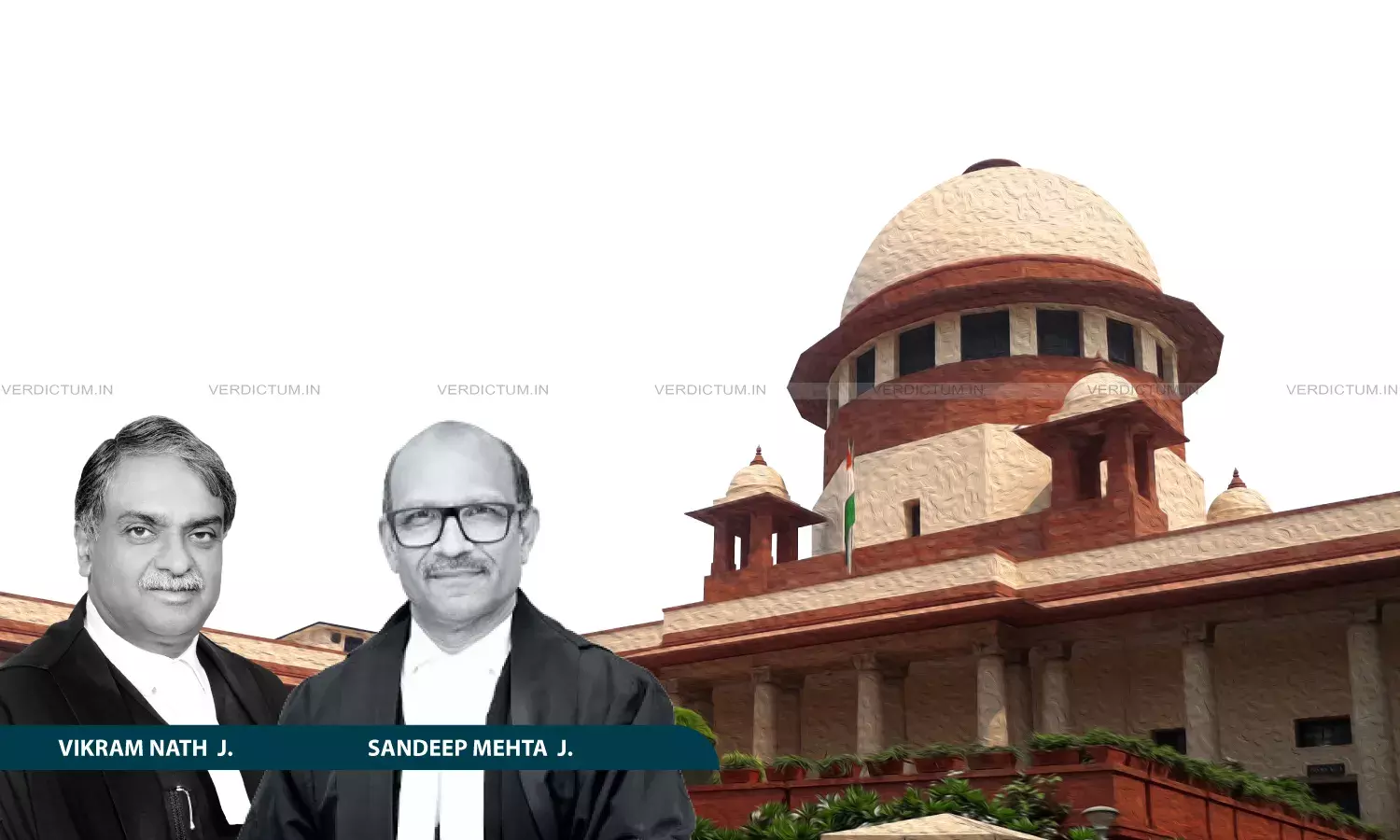Constitutional Bar Against Retrospective Imposition Of Harsher Penalty Is Absolute: Supreme Court Sets Aside Sentence Under Amended POCSO Provision
The Appeal before the Supreme Court was filed against the judgment passed by the Chhattisgarh High Court, whereby the accused’s appeal challenging the judgment of conviction rendered by the Trial Court was dismissed.

Justice Vikram Nath, Justice Sandeep Mehta, Supreme Court
While upholding the conviction of a man under section 6 of the POCSO Act, the Supreme Court has set aside the enhanced sentence of imprisonment for the remainder of natural life and modified it to rigorous imprisonment for life. The Apex Court ruled that the constitutional bar against retrospective imposition of a harsher penalty under Article 20(1) is clear and absolute.
The Appeal before the Supreme Court was filed against the judgment passed by the Chhattisgarh High Court, whereby the appellant’s appeal challenging the judgment of conviction rendered by the Trial Court was dismissed. By the impugned judgment, the appellant was convicted under Section 376AB of the Indian Penal Code, 1860 and Section 6 of the Protection of Children from Sexual Offences Act, 2012 and sentenced to imprisonment for life, which meant imprisonment for the remainder of his natural life.
The incident occurred on May 20, 2019, while the sentencing was under Section 6 of the POCSO Act, which came into force on August 16, 2019.
The Division Bench of Justice Vikram Nath and Justice Sandeep Mehta held, “The Constitutional bar against retrospective imposition of a harsher penalty under Article 20(1) is clear and absolute. The Trial Court, in applying the enhanced sentence introduced by the 2019 Amendment to Section 6 of the POCSO Act, has effectively subjected the appellant to a punishment greater than that which was permissible under the law in force at the time of commission of the offence which is clearly violative of the bar contained in Article 20(1) of the Constitution of India.”
AOR Shalu Sharma represented the Appellant, while Additional Advocate General Atul Jha represented the Respondent.
Factual Background
The case dates back to the year 2019, when the father of the prosecutrix lodged an FIR stating that when he, his wife, and mother had gone to attend a marriage ceremony in the village, the prosecutrix, then aged about 5 years, was playing outside the house. Being unable to locate their daughter, the mother went to the appellant’s house and questioned him about her whereabouts. Upon being confronted, the appellant fled. The FIR was registered against the appellant, alleging that he had lured the prosecutrix to his house and committed rape upon her.
The Trial Court framed charges against the appellant under Section 376AB IPC and Section 6 of the POCSO Act. The appellant was convicted and sentenced under Section 6 of the POCSO Act to life imprisonment for the remainder of his natural life. The High Court, in the impugned judgment, affirmed the conviction and sentence and held that no leniency could be shown because the victim was a five-year-old child and the crime committed was of a grave and heinous nature. Aggrieved by the said conviction and sentence, the appellant approached the Apex Court.
Arguments
It was the appellant’s case that the conviction was under Section 6 of the POCSO Act and the Protection Of Children From Sexual Offences (Amendment) Act, 2019, which came into force on August 16, 2019, enhanced the minimum sentence to 20 years and redefined "imprisonment for life" to mean imprisonment for the remainder of the natural life. It was the appellant’s contention that the sentencing court erred in applying the amended provisions retrospectively, as the incident in question took place before the amendment.
Reasoning
The Bench found merit in the appellant’s submission that since the offence was committed on May 20, 2019, the amended provision of Section 6 of the POCSO Act, which came into force on August 16, 2019, could not have been applied to his case.
It was also noticed that the sentence of "imprisonment for life, meaning remainder of natural life," as per the amended provision, did not exist in the statutory framework on May 20, 2019, the date of the incident. Under the unamended Section 6, the maximum punishment permissible was imprisonment for life in its conventional sense and not imprisonment till the remainder of natural life.
Thus, partly allowing the appeal, the Bench upheld the conviction of the appellant under Section 6 of the POCSO Act and modified the sentence to that of rigorous imprisonment for life, as understood under the unamended statute. Setting aside the sentence of imprisonment for the remainder of the natural life, the Bench maintained the fine of Rs 10,000.
Cause Title: Satauram Mandavi v. The State of Chhattisgarh & Anr. (Neutral Citation: 2025 INSC 892)
Appearance
Appellant: AOR Shalu Sharma
Respondent: Additional Advocate General Atul Jha, Standing Counsel Abhishek Pandey, AOR Prashant Kumar Umrao

